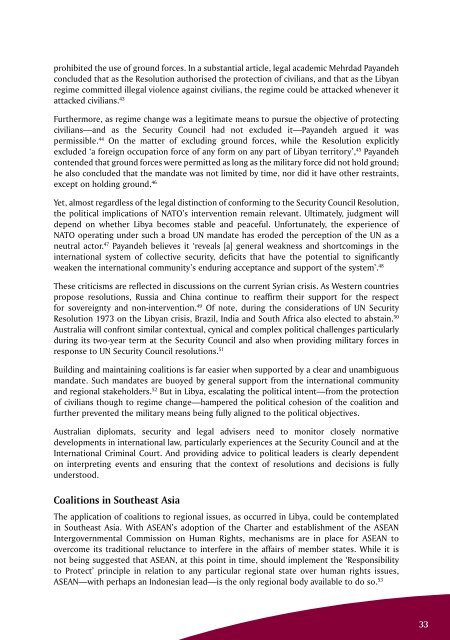ISSUE 191 : Jul/Aug - 2013 - Australian Defence Force Journal
ISSUE 191 : Jul/Aug - 2013 - Australian Defence Force Journal
ISSUE 191 : Jul/Aug - 2013 - Australian Defence Force Journal
- No tags were found...
You also want an ePaper? Increase the reach of your titles
YUMPU automatically turns print PDFs into web optimized ePapers that Google loves.
prohibited the use of ground forces. In a substantial article, legal academic Mehrdad Payandeh<br />
concluded that as the Resolution authorised the protection of civilians, and that as the Libyan<br />
regime committed illegal violence against civilians, the regime could be attacked whenever it<br />
attacked civilians. 43<br />
Furthermore, as regime change was a legitimate means to pursue the objective of protecting<br />
civilians—and as the Security Council had not excluded it—Payandeh argued it was<br />
permissible. 44 On the matter of excluding ground forces, while the Resolution explicitly<br />
excluded ‘a foreign occupation force of any form on any part of Libyan territory’, 45 Payandeh<br />
contended that ground forces were permitted as long as the military force did not hold ground;<br />
he also concluded that the mandate was not limited by time, nor did it have other restraints,<br />
except on holding ground. 46<br />
Yet, almost regardless of the legal distinction of conforming to the Security Council Resolution,<br />
the political implications of NATO’s intervention remain relevant. Ultimately, judgment will<br />
depend on whether Libya becomes stable and peaceful. Unfortunately, the experience of<br />
NATO operating under such a broad UN mandate has eroded the perception of the UN as a<br />
neutral actor. 47 Payandeh believes it ‘reveals [a] general weakness and shortcomings in the<br />
international system of collective security, deficits that have the potential to significantly<br />
weaken the international community’s enduring acceptance and support of the system’. 48<br />
These criticisms are reflected in discussions on the current Syrian crisis. As Western countries<br />
propose resolutions, Russia and China continue to reaffirm their support for the respect<br />
for sovereignty and non-intervention. 49 Of note, during the considerations of UN Security<br />
Resolution 1973 on the Libyan crisis, Brazil, India and South Africa also elected to abstain. 50<br />
Australia will confront similar contextual, cynical and complex political challenges particularly<br />
during its two-year term at the Security Council and also when providing military forces in<br />
response to UN Security Council resolutions. 51<br />
Building and maintaining coalitions is far easier when supported by a clear and unambiguous<br />
mandate. Such mandates are buoyed by general support from the international community<br />
and regional stakeholders. 52 But in Libya, escalating the political intent—from the protection<br />
of civilians though to regime change—hampered the political cohesion of the coalition and<br />
further prevented the military means being fully aligned to the political objectives.<br />
<strong>Australian</strong> diplomats, security and legal advisers need to monitor closely normative<br />
developments in international law, particularly experiences at the Security Council and at the<br />
International Criminal Court. And providing advice to political leaders is clearly dependent<br />
on interpreting events and ensuring that the context of resolutions and decisions is fully<br />
understood.<br />
Coalitions in Southeast Asia<br />
The application of coalitions to regional issues, as occurred in Libya, could be contemplated<br />
in Southeast Asia. With ASEAN’s adoption of the Charter and establishment of the ASEAN<br />
Intergovernmental Commission on Human Rights, mechanisms are in place for ASEAN to<br />
overcome its traditional reluctance to interfere in the affairs of member states. While it is<br />
not being suggested that ASEAN, at this point in time, should implement the ‘Responsibility<br />
to Protect’ principle in relation to any particular regional state over human rights issues,<br />
ASEAN—with perhaps an Indonesian lead—is the only regional body available to do so. 53<br />
33

















